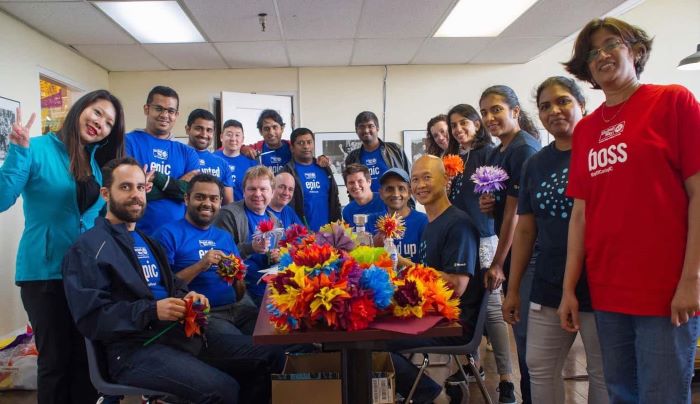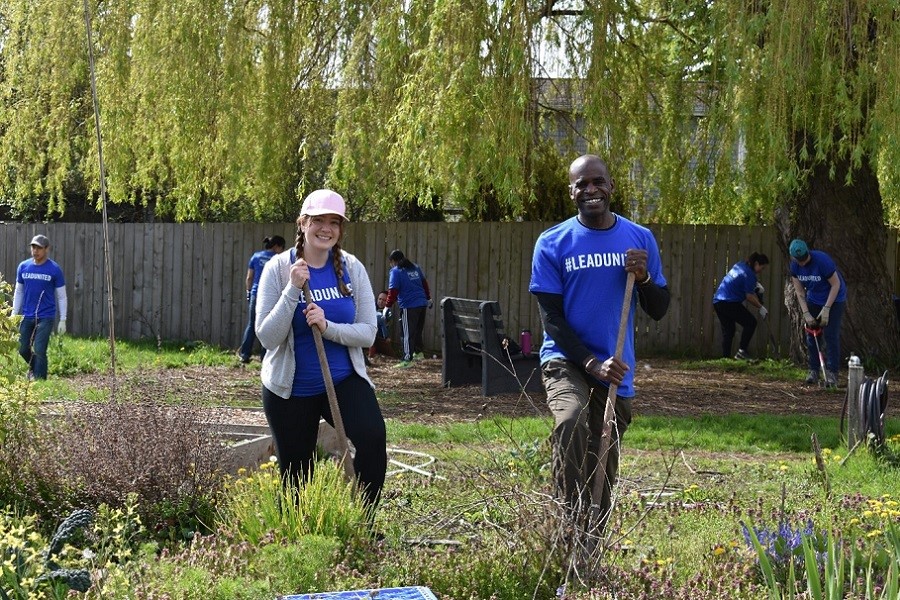Let’s Center the Needs of Communities in Volunteerism
April is National Volunteer Month, which Volunteer.gov defines as a time to “celebrate and recognize the contributions of volunteers.” We at United Way of King County do the same year-round, and we are proud to offer opportunities and events for people to be engaged through volunteering, including our website’s volunteer page, our Volunteer and Learn series, and our National Volunteer Month events.
But we are also proud to be part of a growing number of organizations that seek to redefine what it means to volunteer, particularly in communities hampered by generations of racial, social, and economic injustice and disparity. We at United Way are determined to see the commonality between us and those whom we serve and advocate for.
We believe we can effectively serve those communities only if we are in relationships with them and truly understand what they need. And we believe the same holds true for volunteerism.
We believe that volunteerism in local communities is about more than converging on food banks, shelters, distribution centers, or community gardens with your sleeves rolled up, eager to put in work. It’s also about asking and being granted permission to volunteer your time, your labor, and your talent.
And it’s also about being able to hear a nonprofit say, “Thanks, but no thanks,” or “Sure, but not right now,” or “Sure, you can help us, but first learn about our work and then come back.”
For some, this might run counter to vintage volunteerism. For years, United Way and many other nonprofit organizations have believed that the best way to raise funds is to encourage donors to decide to invest with their heads and the amount of money with their hearts.
“Will you support United Way?” we’d ask. They’d say, “Yes, I will support United Way,” and then they would support based on their emotions. And how do you get that emotional connectivity to a nonprofit? By introducing them to the work that is closest to humanity, that which is about supporting and uplifting. Often, the way we did that was to create a volunteer opportunity.
I think United Way was very much from that playbook, and what we’ve learned is that those volunteer opportunities were designed with the donor in mind, how to get the donor inspired to invest significantly. But it wasn’t driven by the needs of the associated organization or community.
Whatever you do in terms of bringing volunteers into that space has to be done in a way that is meaningful and appreciated by the nonprofit organization or the community that is receiving those services.
United Way of King County president and CEO Gordon McHenry, Jr.
The latter journey is the one we are currently on at United Way, and many other organizations are also on that journey. Volunteerism matters, and it’s important to understand the lived and living experiences of those whom we seek to support. You want to understand what their reality is like. You want to make sure that your position of privilege doesn’t result in you not appreciating the challenges, hopes, and dreams of people.
Whatever you do in terms of bringing volunteers into that space has to be done in a way that is meaningful and appreciated by the nonprofit organization or the community that is receiving those services.
I am really proud that we have moved into that form of community-based volunteerism, which is explicit about social justice issues like disparities based on identity, race, gender, and disability. United Way and other nonprofits are making sure that people understand the organizations they are going to be engaging with, understand the communities they are going to be engaging with, and to understand that this is an opportunity to listen, learn, and support. This is not a place to pontificate to know better; it is a commitment.
Ideally, if it works for the organization and that community, perhaps a relationship is formed, and United Way is part of creating a new relationship that is meaningful mostly for the participating organization and the benefitting community more so that the supporter, the donor, or the volunteer.
My volunteerism originated with the way I was raised. My parents were very active in our church, and they were volunteers in various parts of the church community. That means we were encouraged to do volunteer work in our church community. My brother and I were active in Cub Scouting, and much of that is about good citizenship. I became active in student government in high school, which was a form of volunteerism. I have continued to do volunteerism my entire life.
However, the practice of centering the needs of communities in volunteering resonated with me much more so as an adult than in my youth. It wasn’t something I appreciated until I was volunteering to do environmental restoration work in partnership with one of the local Indigenous tribes when I was on the board of the Mountains to Sound Greenway Trust.
The Indigenous tribe honored us with stories about how they cared for the land and their relationship with the land. That experience helped me understand that there is so much more to environmental justice and the power and importance of understanding the associated cultures when you are working in partnership with the community.
That experience was more than a decade ago, but it was one of the most meaningful experiences because I learned about the Indigenous group’s culture, and then, in partnership with them, I learned things they wanted me to do in the way they wanted us to do it. I learned why doing things a certain way was important to them and how it honored their elders.

It was a very powerful experience, and it helped me understand the importance of more community-based, culturally appropriate volunteerism, where you’re asking for permission to be part of their community and being guided to help them do the work they need to get done. You follow their leadership. You suspend your views and beliefs. And you’re a better person for it.
Volunteerism, at its best, is a form of relationship and not a transaction to achieve an end, such as a corporate outing or a future donor. You volunteer because you seek to be in a relationship with another organization or a community. If we look at volunteerism that way, we are a better Pacific Northwest community.



Comments